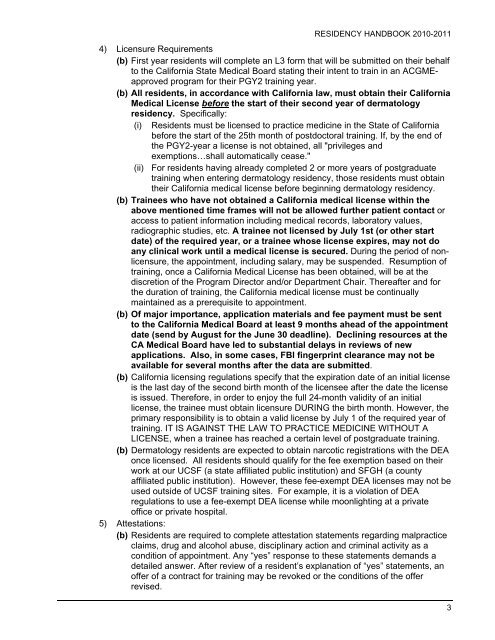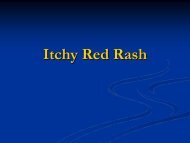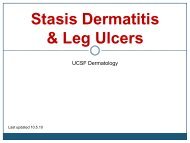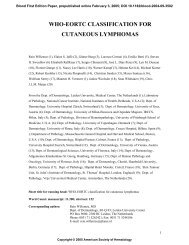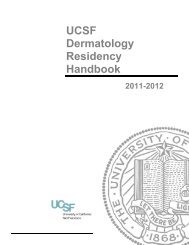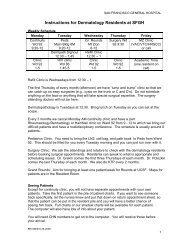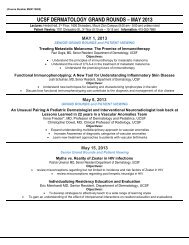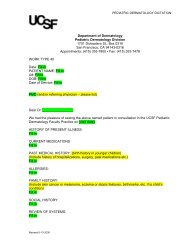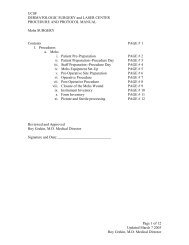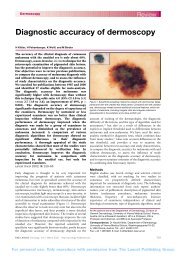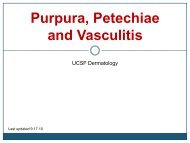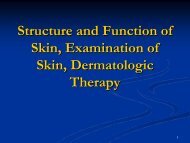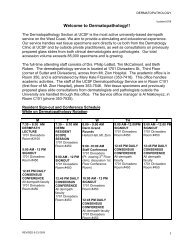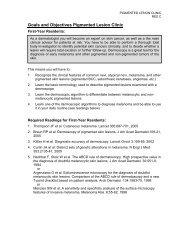UCSF Dermatology Residency Handbook - Dermatology - University ...
UCSF Dermatology Residency Handbook - Dermatology - University ...
UCSF Dermatology Residency Handbook - Dermatology - University ...
You also want an ePaper? Increase the reach of your titles
YUMPU automatically turns print PDFs into web optimized ePapers that Google loves.
RESIDENCY HANDBOOK 2010-2011<br />
4) Licensure Requirements<br />
(b) First year residents will complete an L3 form that will be submitted on their behalf<br />
to the California State Medical Board stating their intent to train in an ACGMEapproved<br />
program for their PGY2 training year.<br />
(b) All residents, in accordance with California law, must obtain their California<br />
Medical License before the start of their second year of dermatology<br />
residency. Specifically:<br />
(i) Residents must be licensed to practice medicine in the State of California<br />
before the start of the 25th month of postdoctoral training. If, by the end of<br />
the PGY2-year a license is not obtained, all "privileges and<br />
exemptions…shall automatically cease."<br />
(ii) For residents having already completed 2 or more years of postgraduate<br />
training when entering dermatology residency, those residents must obtain<br />
their California medical license before beginning dermatology residency.<br />
(b) Trainees who have not obtained a California medical license within the<br />
above mentioned time frames will not be allowed further patient contact or<br />
access to patient information including medical records, laboratory values,<br />
radiographic studies, etc. A trainee not licensed by July 1st (or other start<br />
date) of the required year, or a trainee whose license expires, may not do<br />
any clinical work until a medical license is secured. During the period of nonlicensure,<br />
the appointment, including salary, may be suspended. Resumption of<br />
training, once a California Medical License has been obtained, will be at the<br />
discretion of the Program Director and/or Department Chair. Thereafter and for<br />
the duration of training, the California medical license must be continually<br />
maintained as a prerequisite to appointment.<br />
(b) Of major importance, application materials and fee payment must be sent<br />
to the California Medical Board at least 9 months ahead of the appointment<br />
date (send by August for the June 30 deadline). Declining resources at the<br />
CA Medical Board have led to substantial delays in reviews of new<br />
applications. Also, in some cases, FBI fingerprint clearance may not be<br />
available for several months after the data are submitted.<br />
(b) California licensing regulations specify that the expiration date of an initial license<br />
is the last day of the second birth month of the licensee after the date the license<br />
is issued. Therefore, in order to enjoy the full 24-month validity of an initial<br />
license, the trainee must obtain licensure DURING the birth month. However, the<br />
primary responsibility is to obtain a valid license by July 1 of the required year of<br />
training. IT IS AGAINST THE LAW TO PRACTICE MEDICINE WITHOUT A<br />
LICENSE, when a trainee has reached a certain level of postgraduate training.<br />
(b) <strong>Dermatology</strong> residents are expected to obtain narcotic registrations with the DEA<br />
once licensed. All residents should qualify for the fee exemption based on their<br />
work at our <strong>UCSF</strong> (a state affiliated public institution) and SFGH (a county<br />
affiliated public institution). However, these fee-exempt DEA licenses may not be<br />
used outside of <strong>UCSF</strong> training sites. For example, it is a violation of DEA<br />
regulations to use a fee-exempt DEA license while moonlighting at a private<br />
office or private hospital.<br />
5) Attestations:<br />
(b) Residents are required to complete attestation statements regarding malpractice<br />
claims, drug and alcohol abuse, disciplinary action and criminal activity as a<br />
condition of appointment. Any “yes” response to these statements demands a<br />
detailed answer. After review of a resident’s explanation of “yes” statements, an<br />
offer of a contract for training may be revoked or the conditions of the offer<br />
revised.<br />
3


